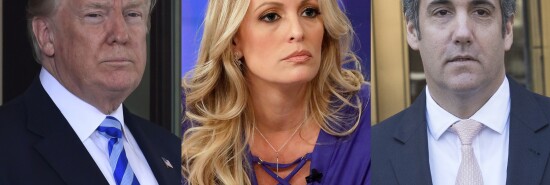
Donald Trump arrest: Alvin Bragg paints the electorate as the victims of the Trump Organization’s payments to Michael Cohen
Tiana Lowe
Video Embed
Watching Alvin Bragg’s press conference after his arrest of Donald Trump, I couldn’t help but wonder: Had the Manhattan district attorney even read his own indictment of the former president?
Bragg charged the former president with 34 felony counts of falsifying business records in the first degree, all related to 2017 payments from the Trump Organization to Trump’s former personal fixer Michael Cohen. The payments to reimburse Cohen for his $130,000 hush money payment to Stormy Daniels happened outside of the five-year statute of limitations for the specific charges, something Bragg refuses to explain away in the indictment. Perhaps this is because, as evidenced by his post-arraignment presser, Bragg views himself as prosecuting Trump with more than the mere legal code.
DONALD TRUMP ARREST: BRAGG OUTLINES ‘CATCH AND KILL’ SCHEME INVOLVING TWO WOMEN
In his indictment, Bragg fails to answer whom exactly Trump had the “intent to defraud” when falsifying business records, a crucial stipulation of charging the offense as a felony. But his press conference, with the questions it didn’t answer and the narrative it spun, provided the answer.
“In total, the grand jury found there were 34 documents with this critical false statement,” Bragg said at the beginning of his press conference. “Why did Donald Trump repeatedly make these false statements?”
But Bragg then goes on not to detail how the Trump Organization’s payments to Cohen constitute felonies on Trump’s part but rather the implicit answer to who Trump defrauded.
“The evidence will show he did so to cover up crimes related to the 2016 election,” Bragg responded to his own rhetorical question, then detailing not the payments related to Daniels but the payments National Enquirer publisher David Pecker made to buy the silence of a former Trump Tower doorman who once alleged Trump secretly fathered a baby with his housekeeper.
No matter that Pecker allegedly offered to “catch and kill” negative stories about Trump in 2014, before he declared his candidacy for the 2016 election. The fact is that under the purview of New York state’s criminal code, the voters in the 2016 election cannot be considered the victims of very narrow felonies.
Bragg’s Statement of Facts spins the same story, ignoring the minutiae of his legal alchemy to charge Trump with crimes outside of the statute of limitations. Instead, he paints a narrative that individual schemes, including the Pecker payment that has never been tried in court, amount to one grand crime, one maybe not delineated in the criminal code under Bragg’s jurisdiction but one that, in its totality, defrauded the American electorate.
Thus, the incongruence between the indictment and literally everything else out of Bragg’s mouth makes sense. His legal argument only has to stick on paper — the rest of his argument just asks us, the people, to see ourselves as victims of the democratic process, Trump’s shady dealings included.
